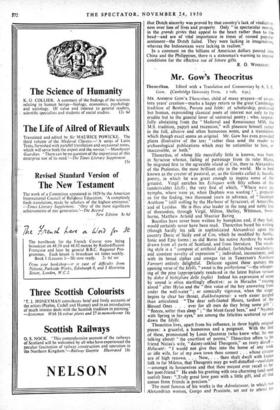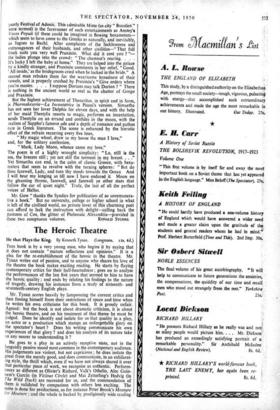Mr. Gow's Theocritus Theocritus. Edited with a Translation and Commentary
by A. S. E. Cow. (CambMge University Press. 2 vols. 63$.) MR. ANDREW GoW's Theocritus, child of many prayers-6f seven- teen years' creation—marks a happy return to the great Cambridge tradition of Bentley, Porson and Jebb: of scholarship, profound but human, expounding classical poets of interest not only to the erudite but to the general lover of universal poetry ; ,who, respect- fully- abstaining from the "Medieval and Renaissance MSS, the M.S. tradition, papyri and recension," will pleasure himself rather in the full, allusive and often humorous notes, and a translation which though exact seems an original. Mr. Gow has even provided plates illustrative of the text "rather than send the reader to archaeological publications which may be unfamiliar to him, or inaccessible, or both."
Theocritus, of whose life mercifully little is known, was born in Syracuse whence, failing of patronage from its ruler Hier°, he migrated first to the agreeable island Of Cos, then, to Alexandria of the Ptolemies, the most brilliant, city in the world. He is best known as the creator Of pastoral, or, as the Greeks called it, bucolic poetry, in which he was great enough to inspire some of the greatest. Virgil enriches his Eclogues with fifty echoes of the (underivable) ; the very first of which, "Where were ye, nymphs, where were ye, when Daphnis was wasting ? ", prepares us for the finding, two thousand years in advance, of "fountain Arethuse " (still welling by the Harbour of Syracuse), of Amaryllis, and of Lycidas. He is thus also leader in the long and noble line of threnodies, through Virgil, Milton, Shelley, Whitman, Swin- burne, Matthew Arnold and Maurice Baring Bucolics have never been written by bumpkins and, if they had, would certainly never have been read. Theocritus based his writing (though hardly his talk in sophisticated Alexandria) upon the country Doric of Sicily and of Cos, which he modified by Aeolic, Ionic and Epic forms ; as did Burns his native Ayrshire by words drawn from all parts of Scotland, and from literature. The result- ing style is a "compost of artificial dialect, farfetched vocabulary, and constant novelty of expression " ; individual, inconsistent, and with its broad alphas and omegas (as in Tennyson's Northern Farmer) entirely delightful. Delicate against these quivers the opening verse of the Idylls," sweet is the psithyristna "—the whisper- ing of the pine (appropriately rendered in the latest Italian version by dolce ii bisbigliare delle foglie) Indeed his expression of sense by sound is often startlingly effective: as in Heracles "roaring aloud" after Hylas and the "thin voice of the boy answering from under the well-water " ; or comically vigorous, when the singer begins to clear her throat, diakhremptetai: a verb easier gargled than articulated. *The dear soft-footed Hours, tardiest of the Blessed Ones . . . ever for all men do they bring some gift "fleeces, softer than sleep" ; "the blunt-faced bees," and " Nycheia with Spring in her eyes," are among the felicities scattered up and down the Idylls'. Theocritus lives, apart from his influence, in three highly original pieces: a graceful, a humorous and a poignant. With the first of these, pronounced by Louis Quatorze (who knew win'. he was talking about) "the courtliest of poems," Thbocritus offers to his friend Nicias's wife, "dainty-ankled Theugenis," an ivory distaff- Helacate: "I would not give thee into the home of any weak or idle wife, for of my own town thou comest . . . whose citizens are of high renown. . . . Now, . . . thou shalt dwell with Ionian folk in far Miletus, that Theugenis may go well-distaffed—eualakata —amongst its housewives and that thou mayest ever recall to her her poet-friend." He ends his greeting with two charming (and most useful) lines: "Truly great love goes with a little gift, and all that comes from friends is precious." The most famous of his works is the Adonigzusae, in which two Alexandrian women, Gorgo and Praxinoe, set out to attend the yearly Festival of Adonis. This admirable Mime (as city" Bucolics " were termed) is the forerunner of such entertainments as Anstey's Voces Populi (if these could be imagined in flowing hexameters— which seem to have come to the Greeks as naturally, and inevitably, as fugues to Bach). After complaints of the fecklessness and extravagances of their husbands, and other civilities—" That full frock suits you very well Praxinde. What did it cost you ? "- the ladies plunge into the crowd : "The chestnut's rearing. . . . It's lucky I left the baby at home." They are helped into the palace by a kindly stranger, and Praxinde comments in her relief, "Good. 'All inside,' as the bridegroom cried when he locked in the bride." A second man rebukes them for the wearisome broadness of their vowels, and is properly crushed by Praxinoe's "Give orders where you're master. . . . I suppose Dorians may talk Dorian ? " There is nothing in the ancient world so real as the chatter of Gorgo and Praxinde.
But the highest achievement of Theocritus, in spirit and in form, is Pharmakeutria—La Incantatrice in Pisani's version. Simaetha has not seen her lover Delphis for eleven days, and with the help of her maid Thestylis resorts to magic, performs an incantation, sends Thestylis on an errand and confides in the moon, with the realism of Sappho's famous ode and a depth of romance and pathos rare in Greek literature. The scene is enhanced by the hieratic effect of the refrain recurring every five lines, "My magic wheel, draw to my house the man I love."
and, for the solitary confession, "Mark, Lady Moon, whence came my love."
The poem is of a highly wrought simplicity : "Lo, still is the sea, the breezes still ; yet not still the torment in my breast. . . ." Yet Simaetha can end, in the calm of classic Greece, with hexa- meters that seem to revolve with the turning spheres: "But do thou farewell, Lady, and turn thy steeds towards the Ocean And I will bear my longing as till now I have endured it Moon on thy gleaming throne, farewell, and farewell ye other stars that follow the car of quiet night." Truly, the last of all the perfect voices of Hellas.
Mr. Gow "thanks the Syndics for publication of so unremunera- tive a book." But no university, college or higher school in what is left of the civilised world, no private lover of this charming poet can afford to lack the instruction with delight—calling back the pastures of Cos, the glitter of Ptolemaic Alexandria—provided in















































































 Previous page
Previous page